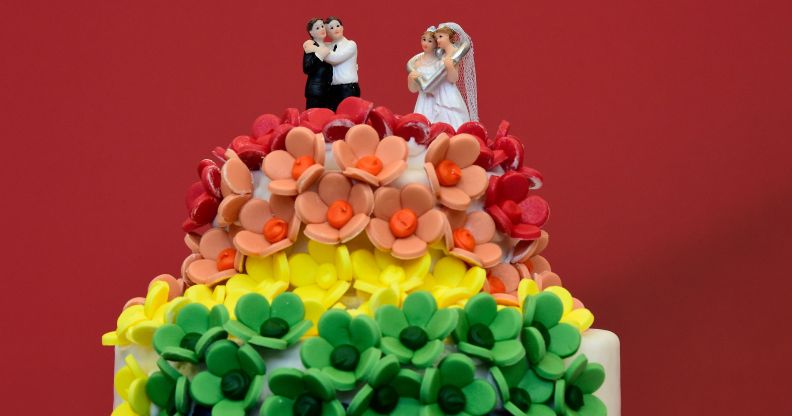These anti-same-sex marriage posters have been graffitied and it’s hilarious

Supporters of same-sex marriage campaign in Australia (Getty)
With just over a month to go until the same-sex marriage postal vote closes in Australia, the Yes and No campaigns are both attempting to win over supporters.
The anti-same-sex marriage Coalition For Marriage is clearly wary of people feeling too ashamed to vote No to giving gay people equal rights.
So much so, it has paid out for a major billboard campaign, stating in black and white: It’s okay to say “No”.

Same-sex marriage ballot (WILLIAM WEST/AFP/Getty Images)
Some on the Yes side of the debate clearly disagree, and have made their opinion known with some snappy graffiti responses, as captured by resident of Hobart, Tasmania, Aimee Clarke.
Related: What the hell is going on with same-sex marriage in Australia?
“The ‘it’s okay to say no’ signs aren’t getting a very good reception in Hobart,” she quipped.

It’s okay to say no to homophobia! (Twitter/@aimeeclarke)
“No it’s not!” has been daubed in response on some posters in the area, while a sticker reading “To Homophobia” has been added to others.
Others have added “To Propaganda” and an incredulous “Really?” alongside the Coalition For Marriage logo.

It’s okay to say no to propaganda (Twitter/@aimeeclarke)
Best of all, someone put enough effort in to totally change the tone of one sign with a simple bit of spray paint.
The new message?
It’s okay to say “yo”.
And it really is.

It’s okay to say yo (Twitter/@aimeeclarke)
Nothing can be taken for granted given the somewhat mixed results of pollsters in recent years, as Brexit, Trump and the Corbyn resurgence in the UK were all missed by most surveys.
But an analysis of all surveys since August suggests that, unless Australians are “straight out lying”, a Yes vote seems very, very likely

Equal marriage activists in Australia (SAEED KHAN/AFP/Getty Images)
Specifically, a Sky News poll of 5,000 Australians suggested that a Yes vote is in the bag.
The results of the postal vote will be non-binding, and no legislation for equal marriage has yet been proposed and no draft has been seen by the public.
Related: An Australian kid just had the final say in the argument for same-sex marriage
However, it is thought that should a Yes vote win, it will be politically difficult for the legislation not to pass.
Should same-sex marriage be legalised in Australia, it has been suggested that the country could enjoy a $1 billion tourism boost.

